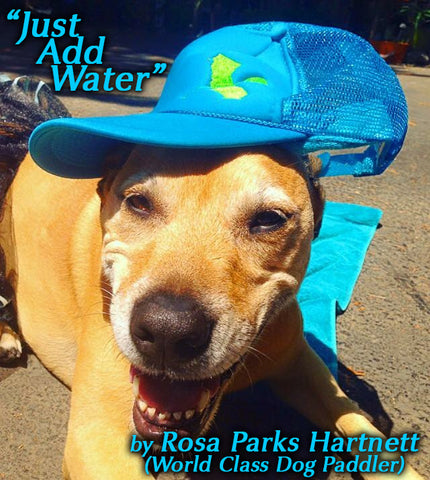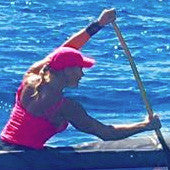[We welcome back the team of Shanimal Fitness, with a special guest appearance from Rosa Parks Hartnett (World Class Dog Paddler), who share's perhaps the best collection of tips and knowledge for keeping your mind as sharp as your body. Give your self an edge and listen up. ~CP #paddledogwisdomer]
Written by Rosa Parks Hartnett (World Class Dog Paddler)
Edited by Shannon Hartnett (B.S. in Exercise Physiology, Masters in Sports Psychology)

A lot of athletes think that training is like a staircase you climb straight up, but it has many plateaus. Sometimes you step backwards and sometimes you feel like you have been standing on the same step forever. When you learn a new skill or technique, sometimes you may go backwards in your performance. This is when people tend to quit the sport. Instead of quitting, master it. Learning to train properly for your particular sport can shorten your learning curve, up your skill level quicker and help with focusing and goal setting in your everyday life. If you keep switching different stroke technique each week you won't get better at paddling, you will just get frustrated.
Most coaches teach the same technique to every athlete, but people have different builds, long arms, short arms, male, female, and different strength ratios. Adjust the skill to fit your body type and what feels right to you. For an example, when a team competes from Iceland they come from a smaller and similar gene pool, therefore their body structure, abilities and strengths tend to be very much alike. Because of this, they can paddle together without a lot variation in style. If you have a crew with all different types of people, it's much harder to dial into specific technique, so adjust your paddling to benefit your team and you. This can be difficult, but as many seasoned athletes know, it’s just a part of the process of getting better. Sometimes you can train really hard and see little or no gains, other times you are amazed by the progress you have made and have no idea how you got there. Training is training it all seems to all blend together after a while. Having passion for your sport gives you the motivation to continue to drive through the tough times and hold your focus.
Athletes who diligently train their minds compete at their best more consistently. Studies show they experience greater enjoyment and increase their odds of victory. As a person progresses to the higher level of their sport, physical skills tend to balance out among competitors. How then, does the athlete distinguish her/himself from the competition? This is where we discover that having a superior mindset is the key to gaining the upper-hand.
- Be 100% focused on each stroke in practice and racing. Practice like you race
- When you are exhausted don't let your mind go to how tired you are or self pity. Review your mental check list on each part of the stroke.
- Never take a loss as a disappointment. Use it as an advantage. You will learn a lot more when you lose in a competition then standing on the top of the podium. In these opportunities you must reevaluate your training, eating, technique and your mental toughness. This is where huge growth can come from. Don't miss that opportunity.Remember someone, somewhere is always going to run faster, jump higher, paddle better. Just focus on yourself, that is the only person you can change.
- Having supreme, unwavering confidence in your abilities
- The capability to keep a laser-like focus when surrounded by distractions
- The capacity to sustain a high-level of motivation throughout a long season
- The strength of will to conquer all anxiety, frustration, and discouragement
- The power to bring your intensity to the next level when needed
- The body thinks in terms of movements and not muscles. So thinking about the intention of the movement rather than the flexion of the muscle.
- Clear and challenging short and long-term goals
- Visualization of perfect technique and always succeeding in the water
- Positive, energetic self talk used to motivate yourself into a positive frame of mind
- A consistent breath through every stroke
- Walking and talking with confidence, perpetuate the feeling of success in your body and mind
- To maximize your workouts outside of the boat, you want your training to be specific to paddling. Your power, speed and movement should mimic your sport.
- As a famous coach once said (Josh Luria) "If you want to be better at paddling, paddle"
- Always ask questions
- Training should be both effective and efficient. Efficiency is created by eliminating extra movements or loads that have a negative impact on your body and sport
- Listen to your body, don't overtrain just because it is written on a piece of paper
- Adding variation to training will force the body to learn because the constant change forces adaptation and motivation which is crucial for learning
Stress can be very positive. Positive stress puts you in the right mindset, it gets you in the “zone". A paddler can choke from a lot of different things, but most of the time it's from not being fully 100% conscious on the water. Not being in the moment is a mind that is set in confusion; when you’re thinking about pain, a boat passing you or even thinking about past competitions, you lose your edge.
Meditation is another great tool to elevate your sport. It is now being used in some branches of the military. There was a study done on recruits in bootcamp, the trainees loss an average of 22 lbs in three days from the stressful training. Their norepinephrine ( norepinephrine is a chemical used by the brain, to keep you frontal lobes in check in order to think critically) was measured in the body to see how the soldiers coped with stress. The best way to build up stress tolerance is by training in high stress environments.
One of the best ways to control stress and slow the heart rate down is deep breathing. Controlled deep breathing helps to send signals to the sympathetic nervous system to slow down the overactive heart. This is one of the reasons why the military is using meditation.
The Samurais and other warrior cultures have been using meditation for thousands of years to train their body and mind for combat. The Samurais knew one thing, that fear is an emotion that derails their attention, and an unfocused state of mind is not good for survival.
Although we are not in combat when we paddle we can learn and integrate these ideas into becoming the best paddler we can be.
When meditating, go through every stroke of the race, including standing on the podium. If your technique is not 100% during mediation, you must start over. After visualizing being in the boat, begin to watch yourself from afar just like you are watching a movie. This brings you to a different level of focus and will make you a better paddler.
“The mental part is the hardest part, and I think that’s what separates the good players from the great players.” – Michael Jordan
"The key is not the 'will to win'...everybody has that. It's the will to prepare to win that is important." -Bobby Knight
 Team Writer Shannon Hartnett - Shannon Hartnett has been a fitness trainer for over 20 years. She graduated from college in the fitness industry at Cal Poly SLO and at Sonoma State. Shannon also competed in basketball and track and field in college. Shannon was a professional athlete for 22 years and has spent a lot of time at the different Olympic Training Centers. Shannon has many specialized training certificates such as rehabilitation certification, kettle bells, TRX, MOR Bar and a Yoga instructor
Team Writer Shannon Hartnett - Shannon Hartnett has been a fitness trainer for over 20 years. She graduated from college in the fitness industry at Cal Poly SLO and at Sonoma State. Shannon also competed in basketball and track and field in college. Shannon was a professional athlete for 22 years and has spent a lot of time at the different Olympic Training Centers. Shannon has many specialized training certificates such as rehabilitation certification, kettle bells, TRX, MOR Bar and a Yoga instructor
In the last several years, Shannon began paddling, including Outrigger Canoe, and has raced throughout California and in Hawaii. Visit her website http://www.shanimalfitness.com for a chance to learn more about her fitness and nutrition business and talk paddling!
















Comments